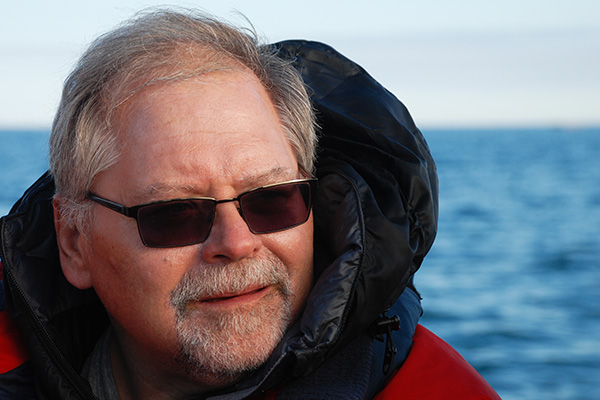Accepting an award, remembering a friend
November 19, 2015
Share
John Smol has received an Arctic research lifetime achievement award named in honour of his friend and former colleague Martin Bergmann.
“I knew and had worked with Marty for many years. He was a great guy who always ‘got things done,’ so receiving the Bergmann Medal is very close to me,” Dr. Smol says.

Mr. Bergmann was an Arctic researcher and director of the Polar Continental Shelf Program with Natural Resources Canada. Mr. Bergmann died when First Air charter flight 6560 crashed in Resolute, Nunavut on Aug. 20, 2011.
Established by the Royal Canadian Geographical Society in 2012, the medal recognizes achievement for “excellence in Arctic leadership and science.”
Dr. Smol received the award for more than 30 years of research in the Arctic. Since making his first trip north in 1983, Dr. Smol has studied climate change effects on the Arctic and water contamination from mining and human activities, as well as a spectrum of other issues.
“During my career, I have had the opportunity to work on a large number of issues all around the region,” says Dr. Smol. “We’ve done a lot of work in the Arctic and we’ve learned a lot about how climate change, contamination and humans impact northern ecosystems. Canada has stewardship over a large part of the Arctic, and the Arctic is a very important part of who we are as a nation.”
While the award recognizes Dr. Smol’s collective work in the Arctic region, he’s quick to point out that he is far from finished. Both the wealth of research opportunities and the landscape itself promises to keep bringing him back.
“A lot of people go up to the High Arctic for two or three years and then family or other obligations prevent them from going back again,” said Dr. Smol. “If you go up one too many times, you’ll keep coming back forever. It’s in your blood. It’s a hauntingly beautiful place and you get hooked.”
Dr. Smol received the award at the annual Royal Canadian Geographical Society fellows’ gala dinner on Nov. 18 in Ottawa. The Honourable Elizabeth Dowdeswell, Lieutenant Governor of Ontario, presented Dr. Smol with the award.